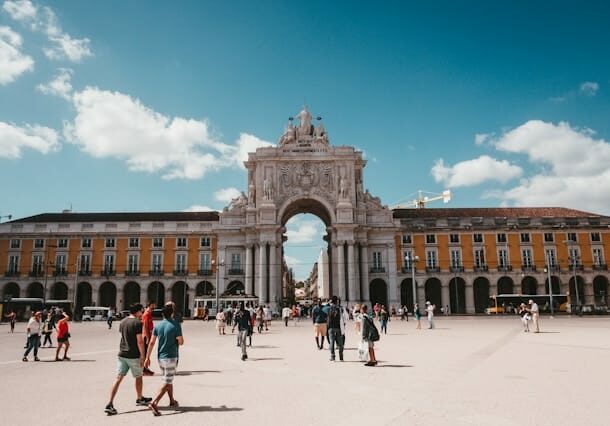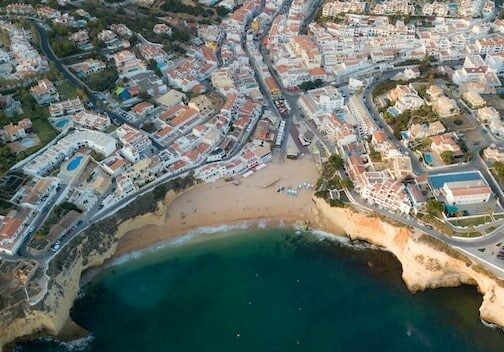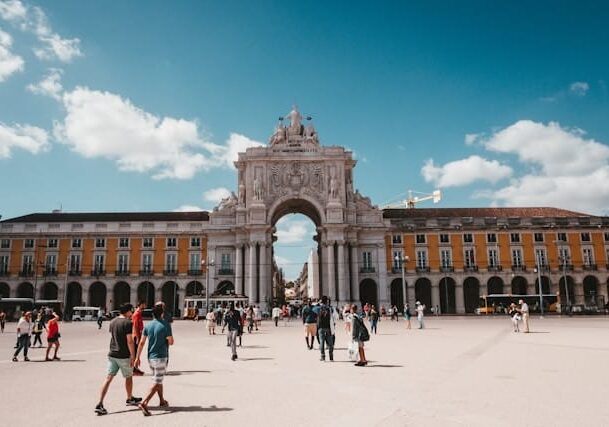Updated: July 1, 2025
Imagine starting your workday with a freshly brewed espresso in a charming café overlooking Lisbon’s cobblestone streets, breaking for lunch on Porto’s scenic Douro River, or wrapping up a productive afternoon with a sunset stroll along the Algarve’s golden beaches.
As the trend of remote working continues its upward growth, Portugal has become a dream destination for digital nomads seeking a perfect blend of professional opportunities and an exceptional quality of life. Working remotely in Portugal is highly sought after due to the country’s reliable infrastructure, warm hospitality, affordable living costs, and stunning landscapes.
Working remotely is especially getting more popular among young expats who like to move around the world freely and enjoy flexible working hours. If you’re considering working remotely in Portugal, this article will give you all the information you need to know.
Why work remotely in Portugal?
According to the Work from Wherever Index released by Kayak, the world’s leading travel search engine, Portugal ranked first as the best country in the world for remote work, ahead of Spain, Romania, Mauritius, and Japan, thanks to its accessibility for remote workers, Portugal’s quality of life, great weather, safety, and high English proficiency.
Portugal remote work is a great choice for freelancers and digital nomads, considering the low cost of living, internet connectivity, and wide range of activities to enjoy once the laptop closes at the end of the day.
In the next sections of this article, we will dive into more details about everything related to remote working in Portugal, including the legal issues, what to expect, and what the best places are in Portugal for digital nomads and expats to settle.
Portugal's Digital Nomad Visa for Remote Workers

- Originate from a country outside of the European Union (EU) or the European Economic Area (EEA)
- Either be self-employed or work for a business based outside of Portugal
- Earn a monthly income that is at least four times the current Portuguese minimum salary, which is approximately €3,280 per month
There are two pathways for the Digital Nomad Visa. Remote workers have the option to seek either a short stay visa, allowing for a temporary stay of up to one year, or a renewable residency permit that can be extended for a maximum of five years. Both categories hold significant appeal, catering to those seeking a short-term temporary stay visa as well as those interested in obtaining a residency visa for a potentially longer-term living arrangement in the country.
In the first two and half months after the Digital Nomad Visa was launched, Portugal granted more than 200 Digital Nomad Visas. As of December 2024, Portugal has issued over 2,600 Digital Nomad Visas since the program began. The Ministry of Affairs in the country has reported that the majority of applications have been received from Brazil, the UK, and the USA.
Legal Considerations for Remote Workers
If you’re an EU citizen who is considering moving to live and work in Portugal, the good news is that you don’t need any visas for working remotely in Portugal. You can simply find the proper accommodation, book your ticket, and fly to the country. In case you’re planning to spend more than three months living and working in Portugal, you will need to fill out an application in the nearest Freguesia to fill out an application and migrate your accommodation.
The situation is a little bit different for non-EU citizens, it may take a little bit longer and include some more paperwork. However, it is not impossible and is much easier than in many other European countries.
Portugal offers many options for remote workers and digital nomads who are non-EU citizens, encouraging them to come to the country to work. After 183 days of your residence in Portugal, you will be considered a taxpayer, and you will need to fill out a tax return application. Now, let’s start the process from the beginning and tell you the more detailed information.
Moving to Portugal as a remote worker

Once you have stable remote work in Portugal, the next step is to decide what visa to apply for – and Portugal offers a lot of options.
As a non-EU digital nomad, you will need to get a valid visa and be able to enter Portugal. Besides the Digital Nomad Visa, another popular option is the D7 Visa. The D7 Visa allows you to work remotely while living in Portugal, as long as you can provide proof of your passive income (which is not obtained from within Portugal). You can work as a freelancer or do remote work, but you must not work for a Portuguese employer.
To be able to get the Portuguese passive income visa you must:
- Provide proof of a passive income required, which is at least the Portuguese minimum wage. In 2024, the Portugal minimum wage is €820 per month. If you want your family to join you as a dependent, an additional 50 percent of the minimum wage is required.
- Obtain a Portuguese NIF Number (Numero de Identificacao Fiscal). You have to apply for a NIF Number at a Finance (Tax and Customs Authority) service point in Portugal. The NIF number enables you to do any activity regarding business or financial transactions.
- Open a Portuguese bank account. Everyone residing in Portugal must have a Portuguese bank account as well as a NIF Number in order for their funds to be valid.
- The residency requirements for the D7 Visa: When the residency card is first issued, it is valid for two years. During this time, permit holders cannot leave the country for six consecutive months or eight months in total during the two-year period. When the D7 Visa is renewed, the new residency card will come with a validity of three years. Permit holders cannot leave the country for six consecutive months or eight months in total during the three-year period.
For investors who are considering Portugal to invest and live in, you can also consider the Portugal Golden Visa. The Portugal Golden Visa Program, also known as the Residence Permit Program, is a five-year residency-by-investment scheme for non-EU nationals. After five years of residency, you will be able to apply for Portuguese cCitizenship.
For a personalized look at the best visa option for you, get in touch with our partner, Global Citizen Solutions. The team can accurately assess your goals and give you expert guidance on the best visa option to choose.
Accommodation for Digital Nomads in Portugal

While considering working remotely in Portugal, you should know that the country has a lot to offer, and you will find many different available options for your accommodation. Just make sure that you start searching for accommodation early, especially if you’re searching in the summer months. Portugal welcomes thousands of tourists each year, and finding long-term rental houses may be a little hard during the peak seasons.
The most popular option for digital nomads and expats in Portugal who are planning to work remotely to search for short-term accommodation is Airbnb. However, if you are planning to stay for longer than a few months, this can get pricey. Try to be specific in your search and add some filters for the places that have desks and work chairs.
There is another alternative to Airbnb, which is NomadX. This is a start-up based in Portugal, intended mainly for digital nomads. You can arrange short and long-term accommodation through this service. It is focused more on areas like Lisbon and Porto, as well as some surf and beach towns between these cities. If you’re considering moving to Lisbon or any other city in Portugal long term, purchasing property is a sound investment that could save you money in the long run.
You can also consider co-living spaces, which are hostels for freelancers and remote workers who can live and work together. This option is a great option for you to socialize and expand your network in the country. Check out Coliving.com.
In addition to the options mentioned above, you can always go old school and book hotels or hostels, if you find that they suit your budget and requirements for working. You can use Booking.com for this category of accommodation search.
Coworking Spaces for Working Remotely in Portugal
A co-working space is a kind of shared office where you pay to use the facilities. Co-working places give you the option to book your spot daily, weekly, or monthly, depending on the availability.
Since expats and digital nomads have been flocking to Portugal recently, the country has a lot of co-working places and qualified offices for this category of workers, and things keep growing. Major areas like Porto, Lisbon, and the Algarve offer various options for remote workers to help people focus and provide a suitable atmosphere for work.
While spending your working hours at one of those co-working places, you will enjoy having your own desk to work on, a good internet connection, and some fresh food and drinks included in the price. Some even have workshops and social events on offer, and you can find like-minded people to get to know and socialize with.
The good thing about Portugal as well is that you can easily work in cafés in many places in Portugal, particularly in the bigger cities, that will give you free Wi-Fi access and a comfy desk to work while ordering something to drink or eat.
You can always use Google maps to categorize your search while trying to find the right place to work in. Also, you can use some apps like Croissant to find a proper co-working space nearby, in which you find the real-time availability in the place you are about to book. It also allows you to buy credit that you can use at multiple co-working spaces.
Internet Connectivity and Mobile for Remote Workers
Everything is done online now and, as a remote worker, it’s almost impossible to settle in a country that doesn’t provide good internet connectivity or mobile service.
If you have already chosen to work remotely in Portugal, rest assured that there are amazing connectivity services in this country. Recently, the internet services in Portugal gained much solid ground and they keep improving quickly.
 Wi-Fi
Wi-Fi
It’s worth mentioning that Portugal ranked 22nd in the world for fixed broadband speeds in November 2024.Portugal features a high-speed internet infrastructure with various Wi-Fi hotspots around the country. You will also find an internet connection in almost all accommodation types and hosts usually indicate their free internet connection in their listing. You may also use fast.com to test the speed of the internet connection in your accommodation.
The average internet package in Portugal (60 Mbps or more, unlimited data, and cable/ADSL) will cost you about €37.35 per month.
 4G and mobile
4G and mobile
Not only is the internet connectivity super in Portugal, but also the mobile connectivity is in good shape. In Portugal, the download speed for smartphones averages at 35 Mbps with pings of just 31ms. You should know that mobile network coverage is the highest in big cities like Porto, Lisbon, and the Algarve area, yet other cities still offer amazing network services.
The main three Mobile companies in Portugal make the field very competitive with the great offers and benefits they grant. MEO, Vodafone, and NOS are the main providers and all three of them are amazing with the services they offer and their team of customer support. You will find their booths at the airport once you arrive, and they offer different internet packages with a minimum of 3GB.
 Electricity voltage and plugs
Electricity voltage and plugs
Before traveling or moving to any country, you should carefully read and know more about which electrical plugs and local sockets you will face. You will never want to put yourself in any critical situation with your phone or laptop charger not functioning. In Portugal, the standard voltage in Portugal is 230 V. The standard frequency is 50 Hz. This is similar to the electricity standard in other European countries, including the UK.
AC plugs and sockets in Portugal include type C and type F like in almost all continental European countries. Type F is the Schuko plug with two round pins of 4.8 mm in diameter. The pins are 19 mm long and 19 mm apart. There are two contact areas at the top and bottom of the plug. Type C is similar but without the contacts.
 Accessibility and security of the internet
Accessibility and security of the internet
Portugal doesn’t apply any kind of restrictions or limits on URLs or websites. So, as an online worker, don’t worry about being monitored by the authorities or something of this kind. As long as you’re legal and using legal websites, enjoy the internet activity freedom, as the country’s constitution clearly provides freedom of speech and freedom of the press.
 Tech shops
Tech shops
Tech shops in Portugal are everywhere, from the moment you land at the airport. You may forget to bring all your tools or accessories, and there is no need to fret; you’ll find everything in Portugal. There are also big tech warehouse sellers and big Apple stores in the main cities and shopping malls. You can also check some online websites like Worten.pt & Fnac.pt.
Life in Portugal for Digital Nomads
Life in Portugal is a mix of over 300 days of sunshine a year, 830 km of coastline, and affordable prices. What else can anyone ask for when seeking a good quality of life?
You will enjoy living in a safe country with friendly people and high-quality services. It may be best to avoid visiting Portugal for the first time during the summer, because this is the high season, and the country gets overwhelmed with the number of tourists. It is not fair to get your first impression about Portugal when it’s so busy, so perhaps visit during an off-peak season. One of the good things about moving and living in Portugal is the Portuguese people are nice and friendly, and you will be able to make many friends quickly with a large number of expat groups.
The official language in Portugal is Portuguese, but no need to worry, your English will do. As most Portuguese people can speak a little English, you will always find someone to help, especially in hotels and hospitals in big cities. Portugal ranked number six in the Global Ranking of English Proficiency, above countries such as Denmark, Germany, and South Africa.
If you’re into languages, you can enjoy learning some Portuguese words, and Portuguese locals will really appreciate you as a beginner and try to help you master the Portuguese language.
If chasing finger-licking foods is your thing, then you will have a great time living in a coastal city like Portugal. This country offers so many seafood varieties in coastal areas. In Portugal, you should try the salt cod (Bacalhau), tomato stews packed with prawns and mussels, and grilled sardines. There are also 39 Michelin-star restaurants in Portugal to choose from, for the very best the culinary scene has to offer.
Best Locations to Work Remotely in Portugal
In the coming section, you will gain some ideas about the big cities and locations in Portugal that may be of interest to you if you’re considering working remotely in Portugal.
Lisbon

In Lisbon, you will find a good transportation network, lovely restaurants to try different things, a good internet connection, and many English speakers. Lisbon is also home to expat groups in Portugal which offer great ways for newcomers to meet and expand their network with people from different nationalities. Check Meetup and InterNations.
Being the capital, Lisbon provides everything you might need in your first days in Portugal, and keep in mind that there you will find all the main governmental offices where you will deal with your paperwork, visa issues, and any legal problems.
Porto

The city’s infrastructure is continuously growing, and this will reflect on your quality of life there and make your day-to-day life easier.
Porto is the second-largest city in Portugal, and it offers great vibes for people who are considering living there.
Like much of Portugal, Porto offers a lot to lovers of history and food. It’s even home to the UNESCO World Heritage Site Ribeira riverside.
The Algarve

No matter where you go in the Algarve, you can find restaurants and cafes that match your unique needs.
Since many tourists in the Algarve hail from the UK, English is widely spoken among the local population, so you won’t need to worry about the language barrier.
Try to target some of the amazing coastal towns like Tavira, Albufeira, Lagos, or Olhão. You can also check the available co-working spaces in the Algarve.
Peniche

The city is very rich with its cultural traditions and has many stunning natural wonders where you can fully immerse yourself in the region.
You will also find Peniche Portugal real estate to be quite affordable compared to other coastal areas, such as the Algarve.
The Baleal village in the north also offers sea-view cafés and fishing taverns.
For a more lively environment, think about Supertubos beach and Peniche city. Nightlife and coastal apartments are more available there.
Final Thoughts for Remote Workers in Portugal
Considering working remotely in Portugal is a wise decision and you will definitely experience the quality of life and the major changes in your lifestyle after spending some time in Portugal. In Portugal, you will get a good amount of everything: Beautiful sightseeing opportunities, charming weather that will boost your mood, delicious food that will satisfy you, and welcoming people who will make you feel at home.
Frequently Asked Questions about Working Remotely in Portugal
Do you need a visa to work remotely in Portugal?
Yes, you do, unless you are an EU citizen. And the good thing about Portugal is that it offers different types of visa programs that may suit you. The most popular ones, if you do not want to make a significant investment in the country, are the D7 Visa and the Digital Nomad Visa.
The D7 Visa allows you to work remotely while living in Portugal, as long as you can provide proof of your passive income (which is not obtained from within Portugal). The Digital Nomad Visa may suit you if you are self-employed or work for a business based outside of Portugal and earn a monthly income that is at least four times the current Portuguese minimum salary.
Can I work remotely for a UK company in Portugal?
Yes, working remotely in Portugal for a UK company is possible and very common among expats. By having a remote job with a UK company, you might be eligible for the D8 Visa (Digital Nomad Visa), which is a good option for non-EU citizens with remote jobs.
Can I work remotely for a US company in Portugal?
Yes, working remotely in Portugal for a US company is very common. In this case, you can live in Portugal with a Digital Nomad Visa, as long as you are self-employed or work for a business based outside of Portugal and earn a monthly income that is at least four times the current Portuguese minimum salary.
Can I live in Portugal but work in the UK?
Yes, it’s possible to live in Portugal and work remotely for a UK company with a residence visa like the Digital Nomad Visa.
Can I work remotely in Portugal?
Yes, you can work remotely in Portugal. If you’re from a European Union or European Economic Area, you can automatically work remotely in Portugal right away. If you’re a non-EU/EEA citizen, you’ll need a visa, like the Digital Nomad Visa, to work remotely in Portugal.
How can I find remote jobs in Portugal?
You can search for remote jobs on online job boards and career networking sites like LinkedIn. Many online sites will allow you to filter the job opportunities for remote jobs.
There are also career websites specifically tailored for remote workers, like Remote OK and We Work Remotely. Another option is to follow specific companies that you know offer remote positions and keep an eye out for when they advertise new roles.
How long can I work remotely in Portugal?
The length of time you can stay in Portugal will depend on your visa. If you opt for the Digital Nomad Visa, you could get a temporary stay visa, which will allow you to stay in Portugal for up to one year. Alternatively, you could get a temporary residence permit, where you could stay up to five years (with renewals).
Can I work remotely in Portugal for a month?
Yes, you can, with the necessary visa. For this length of time, you could opt for the short stay visa category of the Digital Nomad Visa program. Depending on which country you’re from, you may even be able to stay in Portugal for up to three months without a visa.
Is Portugal a good place for digital nomads and remote workers?
Yes, Portugal is an excellent destination for digital nomads and remote workers. The country offers a high quality of life, affordable living costs (compared to other Western European countries), and a welcoming environment for expats. It boasts modern infrastructure, including reliable internet connectivity, co-working spaces, and a vibrant community of remote workers.
Does the Portugal Golden Visa program enable me to work in the country?
The Portugal Golden Visa program is a residency-by-investment initiative that allows individuals and their families to live, work, and study in Portugal. While the Golden Visa is not specifically designed for employment purposes, it provides a residence permit, enabling you to work in the country if you wish.
Does Portugal tax remote workers?
Working remotely in Portugal may have tax obligations, depending on whether you qualify as a tax resident or not. If you are physically present in Portugal for more than 183 days in a tax year, you may become liable to pay taxes in the country. However, tax treaties and double tax agreements can influence how much tax is actually owed. We recommend seeking the guidance of a tax advisor if you are unsure about which taxes you may be liable to pay in Portugal.
Where in Portugal do most digital nomads live?
Digital nomads in Portugal are drawn to Lisbon for its vibrant culture, co-working spaces, and international community, and to Porto for its quieter charm and lower living costs. Coastal regions like the Algarve, known for sunny beaches, are popular for digital nomads who like to balance work and play, and Madeira, with its “digital nomad village,” attracts those seeking scenic island environments.
Where can an American work in Portugal?
Americans can work remotely anywhere in Portugal with the correct visa. Popular locations for US expats include bustling Lisbon, charming Porto, and the sunny Algarve.
What is the WFH allowance in Portugal?
There is no set WFH (work from home) allowance in Portugal. Legally, companies need to reimburse remote employees for home office expenses like internet and electricity. This is usually between €40 – €60 per month.

